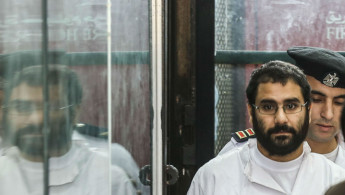Egyptian activist Alaa Abdel Fattah jailed
Alaa Abdel Fattah and Ahmed Abdel Rahman Ali, a pair of political activists lionised during Egypt's 2011 revolution, have each been jailed for five years and issued fines of 100,000 Egyptian Pounds ($13,000).
The two were found guilty by the Cairo Criminal Court on Monday on charges of "assembling, calling for protests, assaulting public persons and properties, blocking roads, and assaulting a police officer".
They will also be placed on police probation for five years, according to the ruling in what has become known as "the Shura Council case".
The court also jailed 18 other protest organisers for three years with similar fines of 100,000 Egyptian pounds each.
Those jailed alongside Fattah and Ali are:
- Yahya Mahmoud Abdel Shafi,
- Abdel Hamid Mahmoud Mohammed Qassem,
- Mohammed Sami Mokhtar,
- Mohammed Hosni Imam Ibrahim,
- Abdel Rahman Atef Sayed Ali,
- Ahmed Mohammed Nabil Hassan,
- Mohammed Abdel Rahman Mohammed Hassan,
- Abdullah Gamal Zaki Mohammed,
- Mamdouh Gamal al-Din Hassan Abdel Wahhab,
- Mohammed Hussam al-Din Mahmoud Ali,
- Mahmoud Yahya Abdel Shafi,
- Mohammed Abdel Karim Taymour Abdel Aziz,
- Mohammed al-Rifai al-Gaz Youssef,
- Mostafi Yusri Mostafi Abdel Wahhab,
- Peter Galal Youssef Farag,
- Mahmoud Mohammed Abdel Aziz Awad,
- Hani Mahmoud Mohammed al-Gamal,
- Salah al-Din Mohammed Hamed al-Hilali
The court sentenced three others in absentia, named as Abdel Rahman Sayed Mohammed al-Sayed, Abdel Rahman Tariq Abdel Sami Ahmed, and Wael Mahmoud Mohammed Metwali, to 15 years in prison and a fine of 100,000 Egyptian pounds each.
| The two were found guilty of 'calling for protests, blocking roads and assaulting public persons'. |
The court acquitted all defendants on charges of robbing a police officer.
The activists' families at the court broke into anti-government chants following the sentencing, crying "down with military rule" and "down with oppression".
First trial
Before the retrial, the Court of First Instance had sentenced the defendants to 15 years in prison, in addition to a fine of 100,000 Egyptian pounds, and to police probation for a period of five years from the day of sentencing.
The public prosecutor had charged the defendants with assaulting West Cairo detective Lieutenant Colonel Emad Tahoun, stealing his radio, staging protests without a permit outside the Shura Council, violating the protest law, rioting and inciting acts of violence, assaulting police officers, blocking roads and assembling, and destroying public and private property.
The defence, led by lawyer and former presidential candidate Khaled Ali, said the actions of the Egyptian prosecutor general were "a legal scandal in every sense".
The defence said the evidence presented by the prosecution was weak and fabricated, or completely irrelevant to the case - and some was only presented in the first trial after multiple adjournments.
The defence team has demanded that questionable evidence referred to forensic examiners. The defence called on the court to request a forensic report regarding the dates stamped on the exhibits, and to return to the records of the hearing held on March 23, 2014, when the exhibits in question were rejected.
The court rejected these requests.
During the hearings, the court interviewed a number of public figures and politicians who were inside the Shura Council at the time of the protests, as they were members of "the commission of 50", tasked with amending the constitution at the time.
These public figures and elected officials testified in favour of the activists in the dock, confirming the protests against trying civilians in military tribunals had been peaceful.
This is an edited translation from our Arabic edition.





 Follow the Middle East's top stories in English at The New Arab on Google News
Follow the Middle East's top stories in English at The New Arab on Google News
![Israeli forces ordered bombed Gaza's Jabalia, ordering residents to leave [Getty]](/sites/default/files/styles/image_330x185/public/2176418030.jpeg?h=a5f2f23a&itok=_YGZaP1z)

